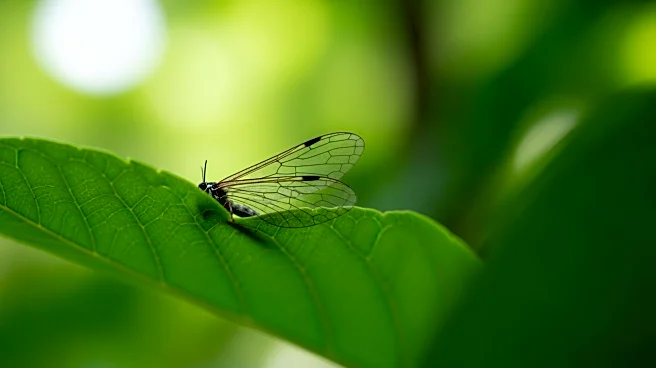What's Happening?
Seven new species of frog-like insects have been discovered by Dr. Alvin Helden from Anglia Ruskin University during fieldwork in Uganda's tropical rainforest. These insects, belonging to the genus Batracomorphus,
are characterized by their green color, large eyes, and frog-like jumping abilities. The discovery marks the first new species of Batracomorphus recorded in Africa since 1981. Dr. Helden's research involved extensive fieldwork and the use of light traps to identify these species, which are distinguished by their unique genitalia structures.
Why It's Important?
The discovery of these new species contributes significantly to the understanding of biodiversity and ecosystem health. Leafhoppers, including the newly discovered species, play a crucial role in the food chain, serving as a food source for birds and other insects. Their presence indicates a healthy ecosystem, and the discovery highlights the importance of preserving rainforest habitats. This research also underscores the value of scientific exploration and the potential for uncovering unknown species, which can inform conservation efforts and ecological studies.
What's Next?
Following the discovery, further research is likely to focus on the ecological roles and conservation needs of these new species. Scientists may conduct additional studies to understand their interactions within the ecosystem and their potential impact on agriculture, as some leafhoppers are known to be pests. Conservationists might advocate for the protection of rainforest habitats to ensure the survival of these and other undiscovered species. The findings could also inspire more fieldwork in underexplored regions, potentially leading to more discoveries.
Beyond the Headlines
This discovery highlights the importance of biodiversity and the interconnectedness of ecosystems. It raises awareness about the need to protect natural habitats from deforestation and other environmental threats. The research also emphasizes the role of scientific inquiry in expanding knowledge and fostering appreciation for lesser-known species. Long-term, these findings could influence conservation policies and encourage sustainable practices that prioritize ecosystem health and biodiversity.










